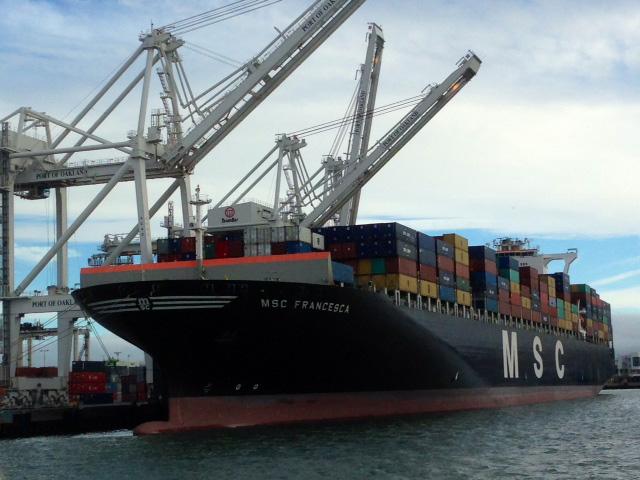Cash Market Moves
Ag Groups Seek Resolution to Container Shipping Crisis
Ocean carriers would be required to accept all U.S. export container bookings under bipartisan legislation proposed by John Garamendi, D-Calif., and Dusty Johnson, R-S.D., and being drafted by members of the U.S. House Transportation and Infrastructure Committee.
The bill is in response to ongoing complaints from agriculture exporters about chaotic supply chain problems they face serving overseas markets due to ocean carrier practices, noted Specialty Soya and Grains Alliance (SSGA) on their website.
The legislative proposal reportedly will call for amending the Shipping Act of 1984 to:
-- Strengthen the Federal Maritime Commission's (FMC) ability to enforce its guidelines for ocean carriers' use of detention and demurrage per diem penalties.
-- Bar ocean carriers from refusing to handle export bookings.
These two issues have been the central complaints of agricultural shippers, SSGA and Agriculture Transportation Coalition, in particular, but also of other U.S. container exporters and importers.
The legislation reportedly will call for increased funding for FMC's Consumer Affairs and Dispute Resolution service to have the resources to conduct stronger oversight.
P[L1] D[0x0] M[300x250] OOP[F] ADUNIT[] T[]
A hearing was held June 15 by a House Transportation and Infrastructure Committee subcommittee on the impact of shipping container shortages, delays and increased demand on the North American supply chain, focusing on the FMC's efforts to address the current shipping supply chain crisis.
"We have a problem in which the shipping industry is able to discriminate against American exporters," Garamendi said during a meeting of the House Coast Guard and Maritime Transportation subcommittee that Tuesday, reported the Journal of Commerce.
In turn, John Butler, president and CEO of the World Shipping Council, which represents major global container lines, told Congress at the hearing the agency has enough power to police bad actors and warned proposals to update shipping law will do more harm than good, according to the Journal of Commerce.
SSGA has reported how U.S. ag exporters, including SSGA members who supply identity-preserved soy and specialty grains for food manufacturers, have suffered under unreasonable practices by ocean carriers. These practices have included declining U.S. ag and other exports in favor of sending empty containers back overseas to keep up with the massive demand for consumer imports.
This imbalance has caused congestion, delays and even cancellations at the ports, and carriers have failed to provide accurate notice of arrival, departure and loading times, reported SSGA. "Carriers have also imposed unreasonable, punitive financial penalties on exporters, who, through no fault of their own, have missed loading windows. This is in violation of detention and demurrage guidelines set forth by the FMC."
Container shippers have asked both FMC and President Joe Biden to intervene on their behalf.
FMC Chairman Daniel Maffei spoke at the National Customs Brokers and Forwarders Association of America on May 5, saying, "The Federal Maritime Commission is committed to doing whatever it can, within the boundaries of its current statutory authority, to address the circumstances impeding the flow of cargo and providing some relief wherever possible. However, I also want to be candid with you about the limits of what the FMC can do both immediately and in the long term. The legislation governing ocean shipping and determining the powers of the FMC make it clear that our job is to make certain the marketplace for ocean transportation services operates with integrity."
Maffei said: "I am hopeful that our FF29 (Fact Finding 29 is an order by the FMC to investigate challenges to the freight delivery system in the U.S. and possible violations of the Shipping Act) investigation itself is starting to deter detention and demurrage practices that do not align with our interpretative rule, and I am confident it will start to root out the noncompliance that may continue. Rest assured, the investigation, supplemented by the other measures we have taken, is the FMC's No. 1 policy priority right now."
U.S. Dairy Export Council President and CEO Krysta Harden said at the June 15 hearing, ""While receiving testimony and answers from Federal Maritime Commission Chair Maffei and Commissioner Dye is a step forward in resolving the issues the U.S. dairy industry faces, we urge House Transportation and Infrastructure Committee leadership to ensure this oversight action results in tangible action to alleviate and resolve the challenges exporters face."
In a news release posted on the U.S. Dairy Export Council website, Jim Mulhern, National Milk Producers Federation president and CEO said: "Dairy producers throughout the country are feeling the consequences of port congestion as delays in loading U.S. dairy exports onto carriers creates a chilling effect on farm-gate milk prices. We thank Chairman Carbajal and Ranking Member Gibbs for holding the hearing to identify what enforcement authority the FMC requires to resolve this crisis and ensure American dairy exports can continue unimpeded."
Specifically, the Dairy Export Council and National Milk Producers Federation noted they believe the FMC should require ocean carriers to certify they are complying with the agency's guidelines. Additionally, the organizations urge Congress to allocate sufficient resources to the FMC to ensure complaints of carrier malpractice are prioritized and investigations are expedited to prevent shipping carriers from engaging in unfair trade practices.
Here is a link to the entire speech by Maffei: https://www.fmc.gov/….
Here is a link to more information on FF29: https://www.fmc.gov/….
Here is a link to the news release from the Subcommittee on Coast Guard and Maritime Transportation hearing, with remarks from Ranking Member Bob Gibbs, R-Ohio: https://republicans-transportation.house.gov/….
Mary Kennedy can be reached at mary.kennedy@dtn.com
Follow her on Twitter @MaryCKenn
(c) Copyright 2021 DTN, LLC. All rights reserved.




